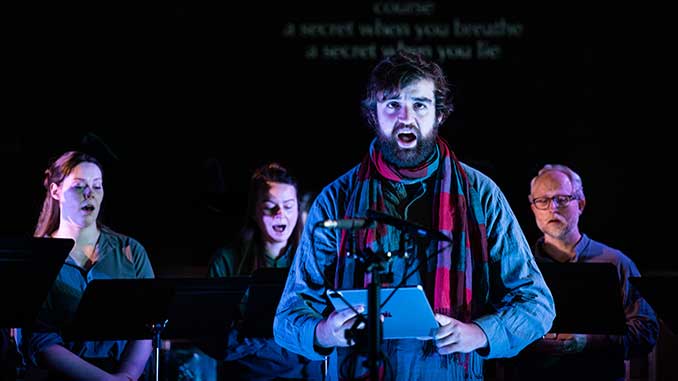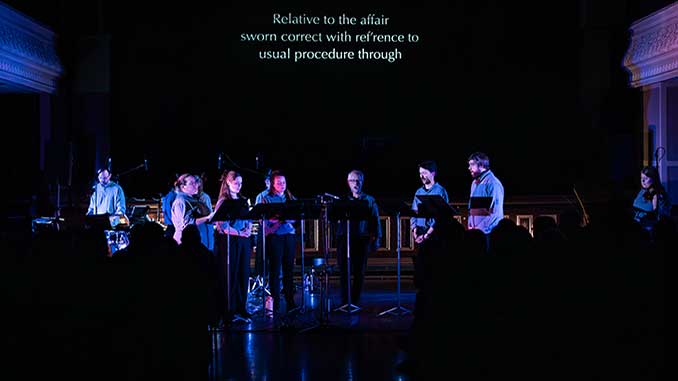 Many amongst us can relate to the words, “I walk where I can’t say if I belong, if I should run the journey of a heart through restlessness I lost and won.”
Many amongst us can relate to the words, “I walk where I can’t say if I belong, if I should run the journey of a heart through restlessness I lost and won.”
Deeply poetic with a powerful core that reverberates with a soul’s truth and coupled with a dynamic, mercurial and absorbing soundscape, these sentiments are crystallised in composer Wally Gunn and librettist Maria Zajkowski’s Moonlite in a profoundly touching encounter with Australian bushranger Andrew George Scott (1842 – 1880).
A thoughtfully conceived work in two acts, Moonlite is an oratorio-style composition brought together in a warmly felt collaboration presented by Melbourne-based Homophonic! and The Consort of Melbourne, directed by respective artistic directors Miranda Hill and Steven Hodgson.
Also known as Captain Moonlite, Scott was a well-educated son of a clergyman who turned to gold digging before a life of crime, prison, escape and bushranging set him on a rickety path to death by hanging at Sydney’s Darlinghurst Gaol.
He also maintained a close and loving relationship with fellow criminal James Nesbitt, 16 years his junior. And, regardless of whether it was of a sexual nature or not – contemporary interpretations of letters Scott wrote in prison clearly suggest the intimacy of a romantic relationship – the pair forged a connection that glaringly spelled LOVE. What else could possibly be thought of a man wearing a ring of another’s hair as he was sent to the gallows?
After Scott was released from a long sentence in Melbourne’s Pentridge Prison where they met, Nesbitt waited for him at the gates. They then moved into a dilapidated boarding house in Fitzroy, close by the grand Fitzroy Town Hall – a fitting location for Gunn and Zajkowski’s premiere work.
Moonlite sprawls with magnificent poignancy across 20 scenes over 90 minutes for six voices, four percussionists and solo violist. Using quotes taken from what are known as his Death Cell Letters, the work effortlessly knits meditative and emotional threads from events when Scott first met Nesbitt to his final days after ambushing Wantabadgery Station near Gundagai where Nesbitt was shot dead by police and died in Scott’s arms.
Under Bronwyn Pringle’s moodily executed lighting and blackened background projecting Zajkowski’s bounteous libretto, rather noticeably and wonderfully effective, all performers are united as equals while working together as a well-oiled ensemble.
 Each vocalist has the moment to set the scene with spoken words and a chance to glow with excellence – Katherine Norman (Soprano), Kristy Biber (Soprano), Elspeth Bowden (Soprano), Timothy Reynolds (Tenor), Jack Jordan (Tenor), Lachlan McDonald (Baritone),
Each vocalist has the moment to set the scene with spoken words and a chance to glow with excellence – Katherine Norman (Soprano), Kristy Biber (Soprano), Elspeth Bowden (Soprano), Timothy Reynolds (Tenor), Jack Jordan (Tenor), Lachlan McDonald (Baritone),
The percussionists, too – Louise Devenish, Kaylie Melville, Hamish Upton and Zela Papageorgiou – blend spoken word with exceptional music-making. And four brilliantly played solo viola interludes by Phoebe Green marking phases of the moon – waxing, waning, full and new – add extraordinary atmosphere to which one’s mind can easily paint a picture.
Gunn achieves so much in bringing incredible variety, breadth and richness to a score combining ricocheting and fractured dissonance, tender melodic beauties, cacophonous harmonies and astute dramatic elan.
Scott’s first encounter with Nesbitt is drawn with affecting intensity by McDonald and Jordan in There I met (scene 4) while Reynolds’ ringing potency in Every tie which could bind (scene 9) is compelling poetry to the preceding spoken words, “We were one in hopes, one in heart and soul. Nesbitt and I were united by every tie which could bind.”
The persistent bush rain that wears out reason when food and shelter is sought pounds with evocative force, the shoot out at Wantabadgery is created with remarkable, terrifying drama and a brief silence after a mounting and menacing crescendo to The weight of it (scene 17) brings a triggering moment of sadness for and reflection on a nefarious but not altogether unprincipled man at his death. The highlights are plentiful.
Scott never went to his grave without shedding remorse and regret. And he went knowing and having lived with LOVE that truly celebrates and defines our complex humanity. Contrary to idolising a convicted felon, Moonlite dignifies life and speaks for Scott with heartfelt solemnity and shimmering spirit – a stellar work that potentially has far to roam.
Moonlite
Fitzroy Town Hall, 201 Napier Street, Fitzroy
Performance: Saturday 26 July 2025 – 7.00pm
Information: www.homophonic.com.au
Images: Moonlite – photos by Darren Gill
Review: Paul Selar
